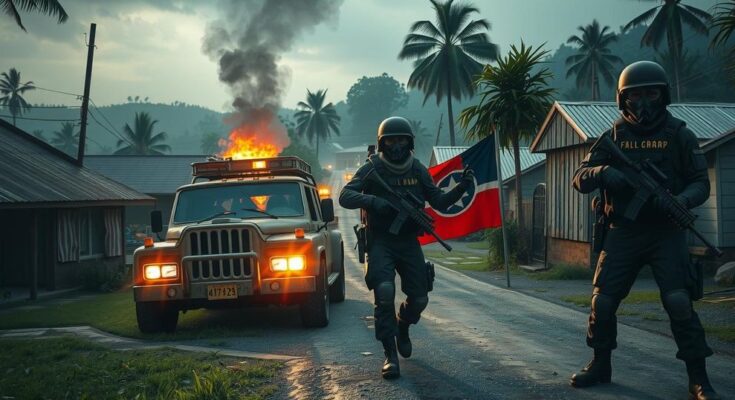Rwanda-backed rebels have seized the town of Masisi in the DR Congo, marking the second town taken by the M23 group in two days. This resurgence has resulted in massive displacement for locals and raised concerns over humanitarian crises. Angolan efforts to mediate between regional leaders have stalled, while accusations persist regarding Rwanda’s military involvement and exploitation of eastern DR Congo’s mineral wealth.
Rebel forces affiliated with Rwanda have successfully captured the town of Masisi in the eastern region of the Democratic Republic of Congo. This seizure marks the second town overtaken by the M23 group within a mere span of two days. The M23 has progressively gained control over extensive areas in eastern DR Congo since 2021, resulting in a significant displacement of residents, with hundreds of thousands fleeing their homes for safety.
Angola has been mediating discussions between President Félix Tshisekedi of DR Congo and Rwandan President Paul Kagame; however, these negotiations collapsed last month. Alexis Bahunga, a member of the North Kivu provincial assembly, expressed his concern regarding the capture of Masisi, stating that it plunges the territory into a severe humanitarian crisis and urged the government to bolster military capabilities in the region.
A local resident relayed that the M23 convened a meeting with Masisi’s inhabitants, asserting that they had arrived to “liberate the country.” As of yet, the Congolese government has not provided a formal response to the loss of Masisi, which is home to approximately 40,000 residents. This town serves as the capital of the territory that bears its name and is situated around 80 kilometers north of Goma, the provincial capital that the M23 briefly controlled in 2012.
Just the previous day, the M23 had taken over nearby Katale. Concerns had previously been raised that the M23 might advance toward Goma again, although hostilities had calmed until early December when fighting reignited. In July, Rwanda acknowledged a UN report suggesting the presence of approximately 4,000 Rwandan soldiers aiding the M23 in DR Congo, accusing the Congolese government of failing to address ongoing conflict in the region. Rwanda has claimed that the DR Congo authorities are collaborating with individuals implicated in the 1994 Rwandan genocide against ethnic Tutsis and moderate Hutus.
Originally formed as an offshoot of another rebel faction, the M23 emerged in 2012 with the purported goal of defending the Tutsi population in eastern DR Congo, who have historically faced persecution. Critics of Rwanda allege that the country is utilizing the M23 to exploit the rich mineral resources of eastern DR Congo, including gold, cobalt, and tantalum, essential for technology such as mobile phones and electric car batteries. Notably, last month, DR Congo announced legal action against Apple for its involvement with “blood minerals,” to which the company responded by asserting it had ceased sourcing from the nation.
The ongoing conflict in the eastern Democratic Republic of Congo, particularly in North Kivu province, has been marked by the resurgence of the M23 rebel group. The M23, initially formed in 2012, claims to represent the interests of the Tutsi population. However, their actions have drawn criticism, with allegations of mineral exploitation in a region that holds valuable resources. The situation is further complicated by Rwanda’s alleged military support for the M23, leading to international concerns and humanitarian crises as large populations are displaced.
The recent capture of Masisi by Rwanda-backed M23 rebels is a significant development in the ongoing conflict in the Democratic Republic of Congo. The actions of the M23 not only exacerbate the humanitarian crisis in the region but also reflect the complex interplay of regional relationships and historical grievances. As Angola attempts to mediate the situation, the international community remains watchful of both the humanitarian implications and the potential for further escalation in the conflict.
Original Source: www.bbc.com




